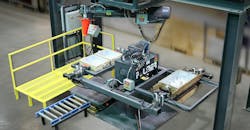It is critical for manufacturers to be on top of new processes and materials, to provide a better product or service. You may be sure that if you don’t, someone somewhere in the world, or your competitor, will do it in your place.
Technically, there is nothing holding back any metalcaster from using the numerous efficiency tools available, from proven RFID and sensor technologies to newer process solutions like additive manufacturing, digital networking, and artificial intelligence. Despite well-documented case studies that highlight the benefits of these advanced solutions and the successful implementation of these technologies by many globally recognized foundries, numerous foundries remain on the sidelines, watching and waiting. Why?
If we all possess the technical know-how to implement advanced solutions designed to produce higher quality products at faster rates, why are we not doing so? I believe the driving force behind our inaction is the 'fear of change.'
Doing nothing is sometimes prudent when you are weighing a decision about a major purchase or new technology. Waiting may be correct, but with the speed of today's technologies doing nothing can be fatal. The risk of being left behind is too great in today’s market, and foundries really have to think about how to know when it’s time to ‘jump in.’
Whereas the status quo appears nice and neat, change is not. Change is constant and comes in all forms and scales. The Greek philosopher Heraclitus said: "Nothing is permanent, except change."
Sand reclamation, for example, gained interest from metalcasters because fracking raised the cost of sand. Suddenly, various reclamation solutions were introduced and very quickly adopted. Nothing provokes change faster than immediate bottom-line savings. Regulatory revisions have a similar effect. No one wants to fight state or federal regulations, so those mandated changes are the easiest to adopt.
Changes that are not required are the ‘disruptive’ solutions that shift the way you make something. It’s much easier to put off doing anything than it is to try something unknown. The risk of being wrong often stops us cold.
How often has a manager tried something new, and failed? The consequences of being wrong are profound: suddenly, the manager is associated with that single misstep, and as others become hesitant to take risks. Why is it that people tend to remember in detail the ideas and efforts that don’t go well, and easily forget the many ideas that succeed?
Sometimes, the fear of doing anything wrong prevents even the most analytical people from attempting to do a proper evaluation or investigation.
To overcome this, metalcasting managers need to establish an environment where well planned risks are encouraged, with the understanding that failures will happen, and to manage failures as learning opportunities. Failing to create that type of environment will promote fear of making any kind of productive changes.
2024 is going to be different for metalcasters because of all of the new technologies affecting operations now – notably Artificial Intelligence. With huge volumes of information being generated every day, and the huge reduction in computing and storage costs, innovative ideas and processes will increase exponentially. The result will be new processes, new materials, and millions of questions to be answered by new and improving computing power.
AI has been declared to be the thing that will change all our lives. It’s also widely believed that AI technology is still developing. AI will increase the speed of change. It’s always important for manufacturers to keep up with new processes and materials, but as millions of people are researching millions of topics, keeping up is more critical than ever.
As manufacturers of high-production-rate molding equipment, we know first-hand that operators wrestle with the fact that these systems don’t need an expensive rollover, and that the molds are handled (flipped) differently. Even with obvious equipment and labor savings, and increases in molds per hour—people struggle with this because it looks different from what they are doing today.
Over the past five years, the progress in digitizing foundry operations is evident, with clear advantages that everyone can see—alerts when machines show signs of wear and production declines, batch-to-batch testing reports that determine quality metrics—and digitization as yet only being deployed at the world's largest foundries.
Currently, technologies aiming to enhance production are being developed for foundries of all sizes and product types, encompassing various casting processes. Open your mind to new ways of thinking about the work you do. It's easy enough to verify the results from innovative technologies, but you must be open to change.
A critical success factor in manufacturing is managers’ willingness to embrace changes. It may be daunting, especially considering the volume of information generated daily. Signaling your openness to change will prepare your team for a changing world, and to overcome the 'fear of change.' Our own curiosity, coupled with Artificial Intelligence, will guide us to the information that makes us better, more efficient, and more profitable. So, do your homework, and be open to doing things differently.
About the Author
Jack Palmer
President
Jack Palmer (1953-2024) was the president of Palmer Manufacturing & Supply Inc., a globally recognized supplier of metalcasting equipment, known for innovative, solution-driven engineering, and high-quality workmanship. They specialize at producing heavy-duty no-bake foundry equipment, including: sand mixers, molding systems, core room equipment, sand reclamation, mold handlers, pumping systems, resin heating systems, sand conditioning, compaction tables, mold and core coating equipment, and complete systems and engineering services.
